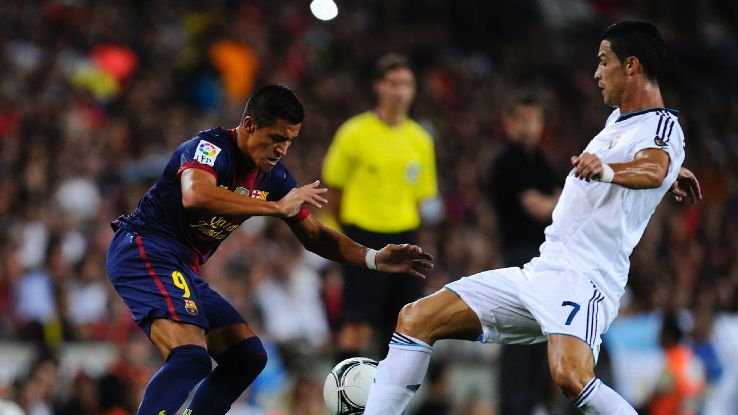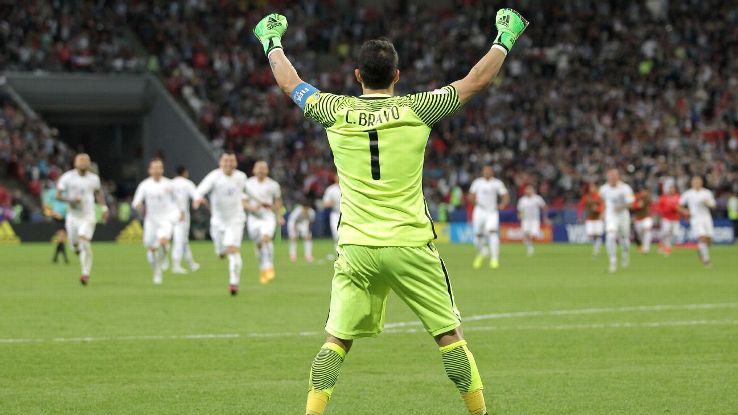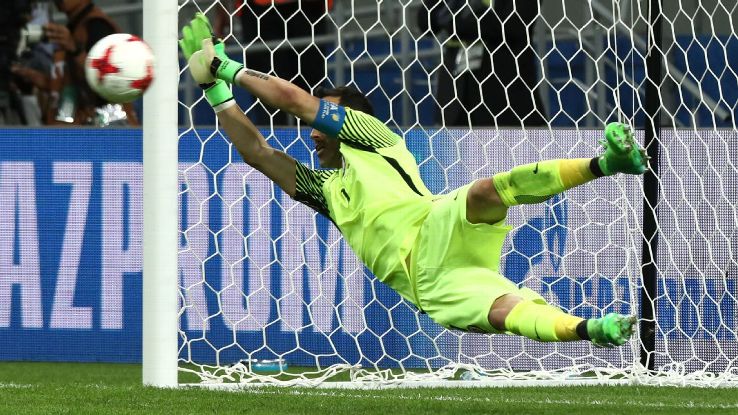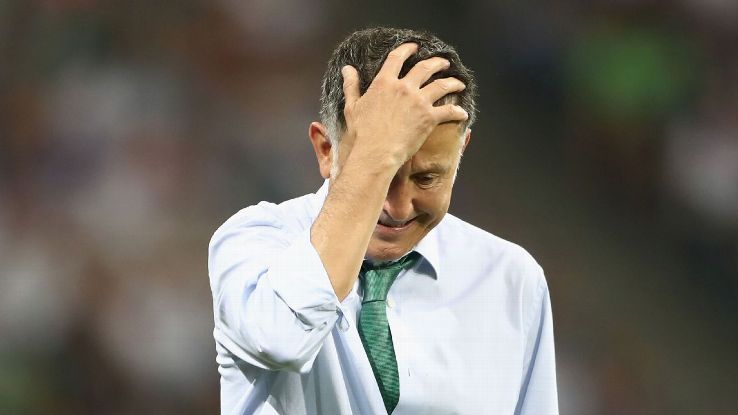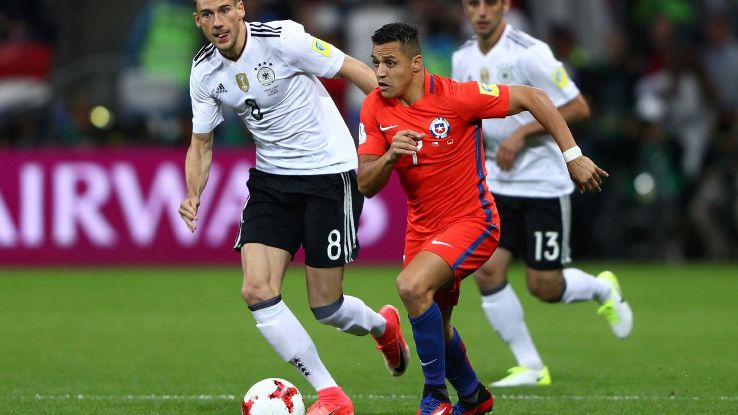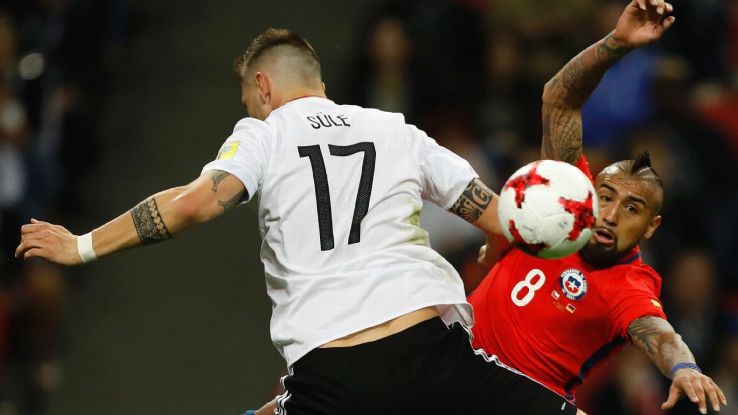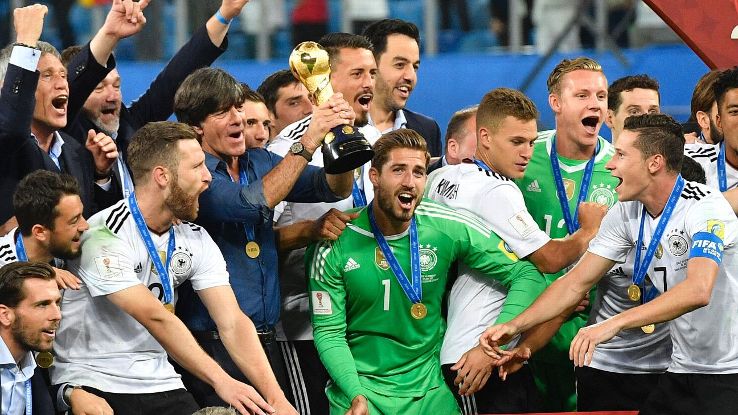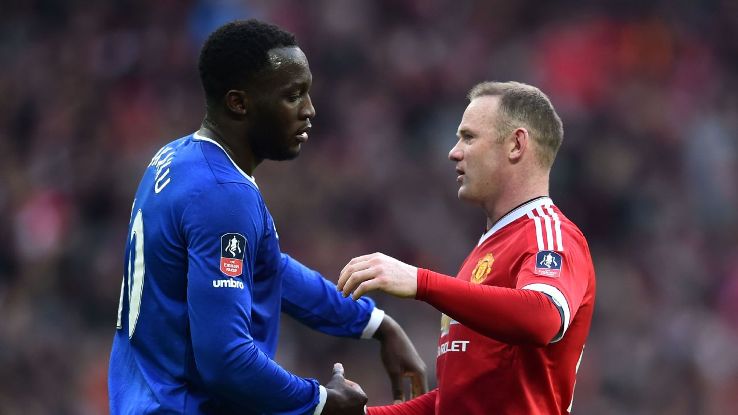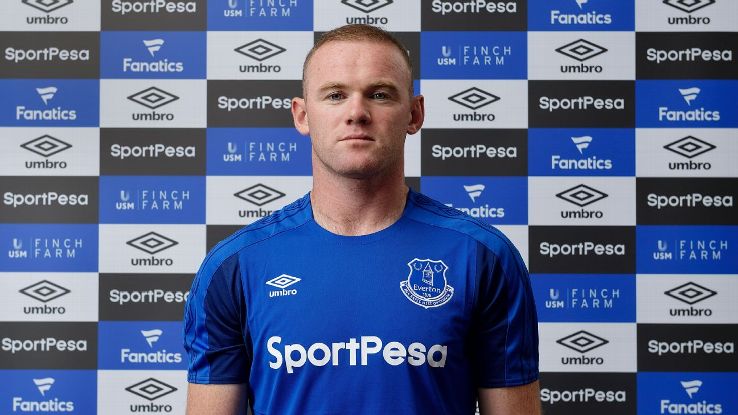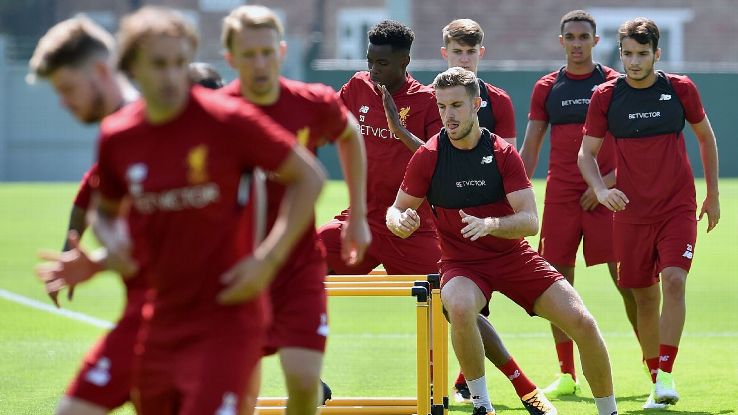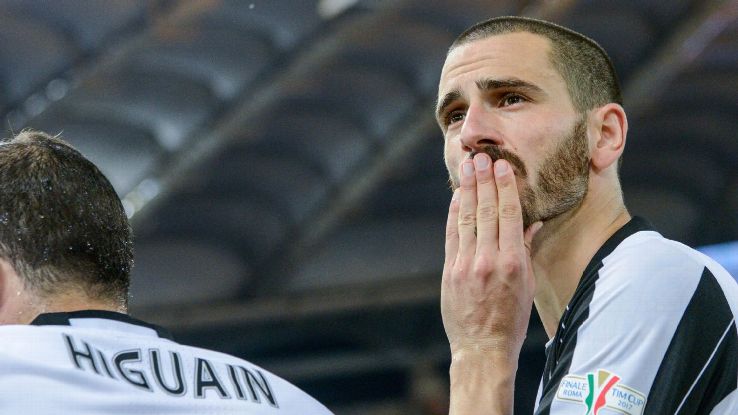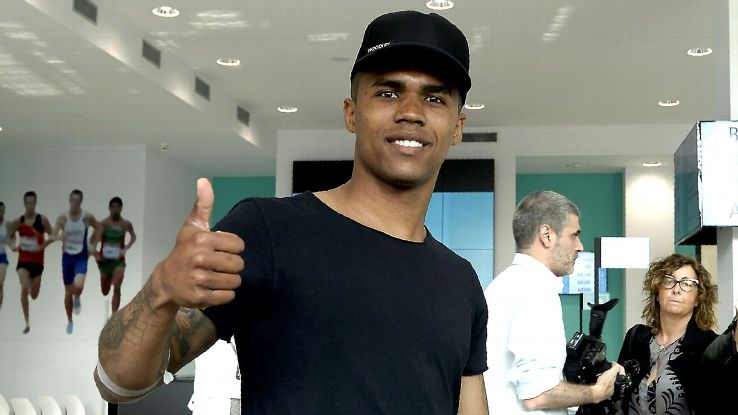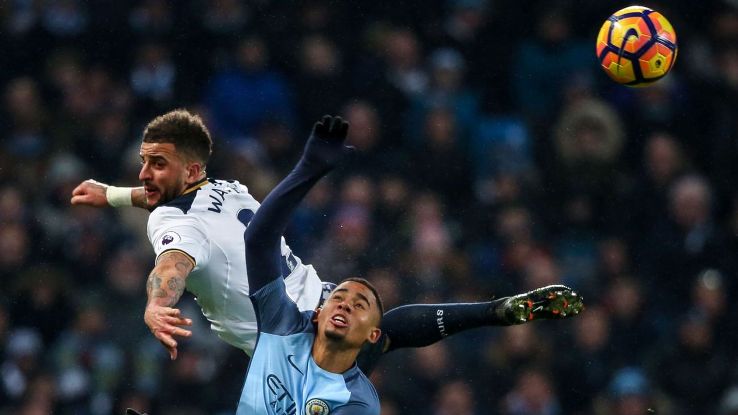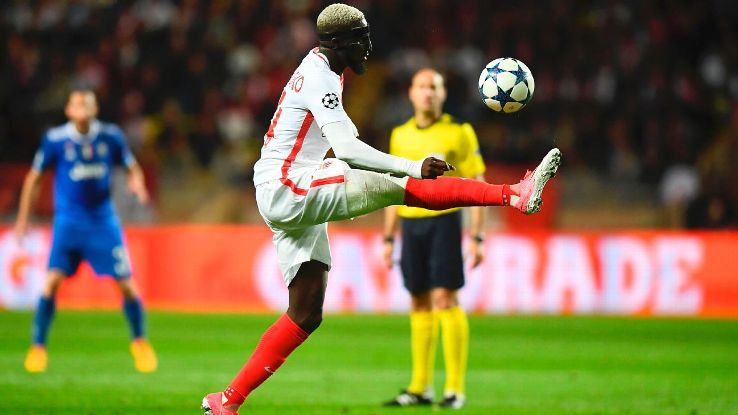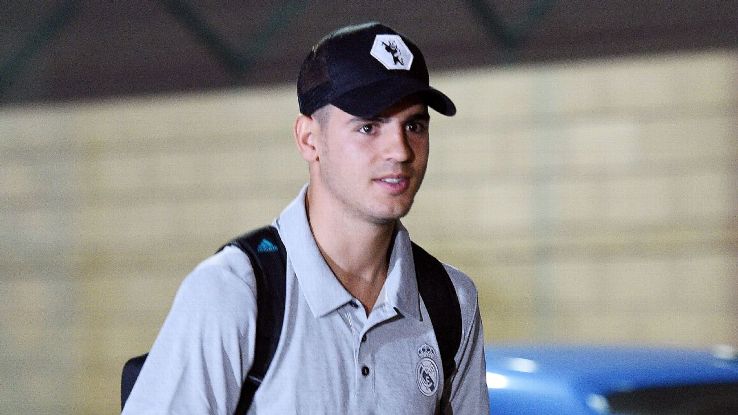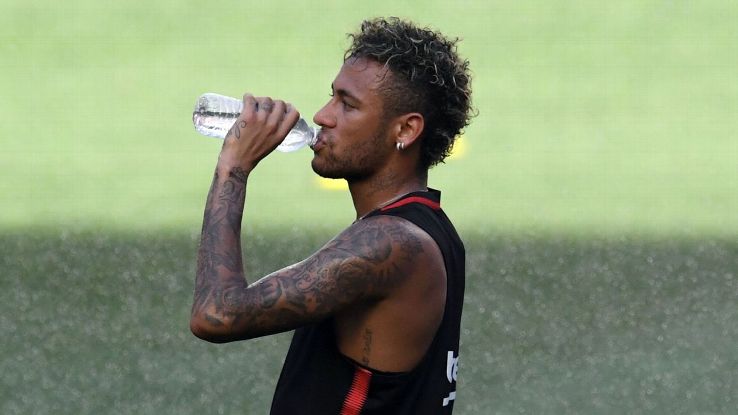Low's German youngsters come of age as they withstand Chile's onslaught
By Gabriele Marcotti
espnfc.com
SAINT PETERSBURG, Russia -- On a day when they were frustrated, intimidated and pegged back by the red horde in front of them, Germany kept their nerve, hunkered down and punished an opponent's mistake for a 1-0 win that sealed the country's first Confederations Cup trophy.
It's what you'd call a veteran performance, borne out of age-old experience and tactical savvy -- except this German side has an average age of 23 and had hardly played together until 3½ weeks ago.
You hate to slip into stereotypes, but when a side this green in terms of experience displays such maturity, you're tempted to credit the magical powers of the white shirt with the four stars on it. Either that or Joachim Low is simply one heck of a coach.
Chile were the home side at the steeply banked Zenit Arena, in which cries of "Chi! Chi! Chi! Le! Le! Le! Fuerza Chi-le!" rained down before kickoff. It might take a minimum of 18½ hours to fly here from Santiago -- with a stopover in Paris -- but a surprising number of La Roja enthusiasts had made the trip.
Maybe it was knowing that, for this Golden Generation, the window of opportunity won't stay open forever -- another World Cup, another Copa America maybe -- and that while travel is pricey, you regret the things you don't do more than the things you do. The dream of telling their grandkids that they saw their nation win silverware in three different continents, over three magical summers, was too special for many to turn down.
But they won't be able to do that. Instead, they will be able to go home and say that their team dominated long stretches of a final against the world champions -- a fearsome side, no matter the absentees -- only to see the trophy slip through their fingers like dust.
"We dominated, we played very well, we controlled the game, but football is the way it is ... sometimes, it's not enough and accidents happen," Chile boss Juan Antonio Pizzi said after the match.
Despite a draining semifinal against Portugal and with Teutonic young legs in front of them, Chile came out of the gate as if the fast-forward button was stuck on. They pressed high and they pressed hard, and Charles Aranguiz, Eduardo Vargas and Arturo Vidal (twice) all had cracks at goal in a furious opening 20 minutes that had Low pacing the sideline as Germany struggled to get out of their own half.
Chile's best chance came after 19 minutes when Marc-Andre ter Stegen spilled a vicious shot from the effervescent Vidal. The ball fell to Alexis Sanchez -- exactly who you'd want in this situation -- but, with ter Stegen on his knees, the forward screwed his finish wide.
And that's when the totally unscientific "Law of Football" kicked in: Miss a chance at one end, get punished at the other.
Marcelo Diaz, dropping deep between the center backs as he always does to build play, made an ill-advised turn into the path of the lurking, ubiquitous Timo Werner. The RB Leipzig striker nicked the ball away and knocked it into space before squaring past goalkeeper Claudio Bravo for the unmarked Lars Stindl to tap it into the empty net.
The classic sucker-punch. We've seen this script before, though rarely with Germany -- they normally take the game to the opposition -- as the ones who turn the run of play on its head.
Low's initial lineup, with three center-backs and Werner on his own up front with Stindl and Julian Draxler behind, was set up to both contain and attack. Before the goal, Germany had little chance to do the latter; afterward, it made more sense to sit and unleash Werner's wheels. A mistake by Gary Medel -- not dissimilar to that of Diaz -- gave Leon Goretzka a shot at making it 2-0, which would have been harsh on Chile.
Pizzi's side pushed on in the second half, but Germany were all too happy to wait and pounce. Tension rose and tempers flared: Bravo clashed with, of all people, Joshua Kimmich, who got an earful from Vidal, his Bayern teammate. Kimmich had talked about how Vidal was a kind of mentor/big brother. Not during these 90 minutes, he wasn't.
Hope for a final without video replay were dashed when Werner, chasing a long ball, was whacked in the jaw by Gonzalo Jara. Referee Milorad Mazic missed the incident, but the VAR did its job in flagging it up. Mazic, following procedure in these situations, took a look at it himself but showed Jara only a yellow card.
"He hit him in the face," Low said after the match. "You expect that to be a red, no?"
The German manager was right, and Mazic's reluctance to send off Jara is sure to further inflame the replay debate. Whatever your view on VAR, it's worth remembering that, without the guys in the booth, Jara would have got away scot-free with what he did.
Still Chile pressed on, taking greater risks and inevitably conceding more at the back. Vidal skied over a great chance, and tempers flared again when, after Sanchez went down, Mazic refused to consult replays. Vargas was booked for his protests.
Pizzi rolled the dice by sending on Edson Puch and Angelo Sagal. They're not part of the Golden Generation, but they had a gilt-edged chance to become honorary lifelong members when Puch cut a ball back for Sagal in front of an empty net. In his first competitive match for his country, the striker skied over the crossbar.
"One of the most difficult things to do in football is score," Pizzi said afterward with a trace of bitterness. "That's why strikers get paid so much money."
(It's not necessarily cruel to point out that Sagal is not one of those strikers with the telephone-number salary.)
Testament to the red fury at the end of the game -- and Low's respect for Chile's threat -- was shown by Germany's use of two defensive substitutions: Emre Can came on for the marauding Goretzka, and the man-mountain Niklas Sule replaced Werner. Germany finished the match with four central defenders, two full-backs and two defensive midfielders.
"We had to fight for every single meter of the pitch to defend our lead," Low said later. "They are an outstanding team. But we were single-minded about this victory. And I am so, so impressed with that. We're talking about a team with so little international experience dealing so well with the pressure, with the nerves, with a talented, experienced opponent. I am mega-proud of them."
Pizzi was proud, too, if deflated: "We knew we can compete with the very best in the world, and we showed it again today. We have to accept that luck and incidents are a part of it. We can't complain."
Referring to the intense, high risk-high reward philosophy that has been a hallmark for Chile under his predecessor Marcelo Bielsa and Jorge Sampaoli, Pizzi added: "We know this is the way forward for us, and we've had confirmation of it again. We go home with no energy left, lots of glory and no trophy. That's football."
As for Low, Germany are like those boxers with an alphabet soup of championship belts: world champions, Under-21 European champions and, now, Confederations Cup champions. And they possess an embarrassment of riches to choose from when it comes to next summer; folks will have a lot of fun speculating who in this squad will crack the 23 for the World Cup.
"You shouldn't be asking that," Low said, stone-faced. "You should be asking which of the guys we left at home are good enough to make it into this squad."
Then he broke into a smile. He was joking. Sort of.

